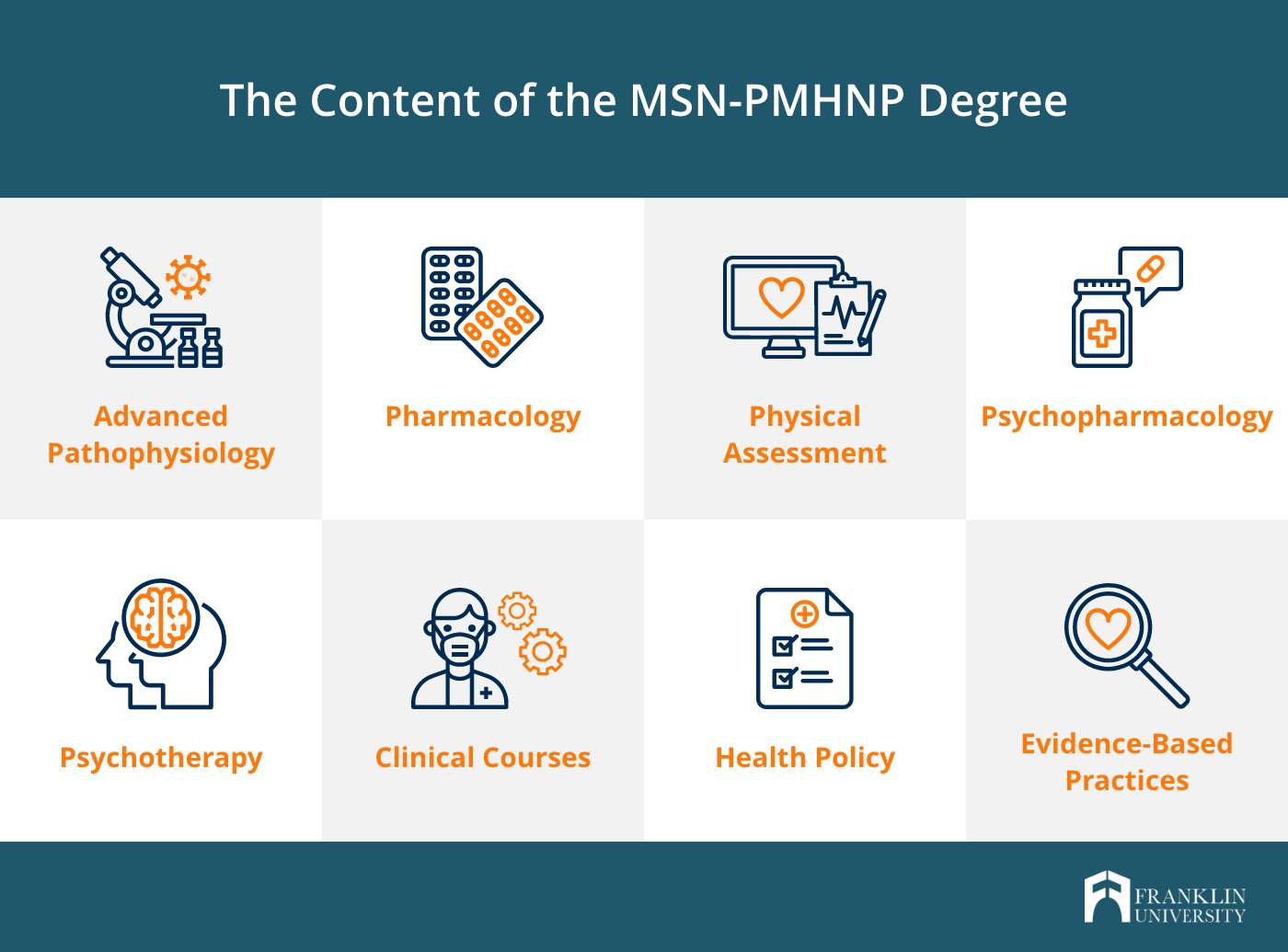Request Information
We're Sorry
There was an unexpected error with the form (your web browser was unable to retrieve some required data from our servers). This kind of error may occur if you have temporarily lost your internet connection. If you're able to verify that your internet connection is stable and the error persists, the Franklin University Help Desk is available to assist you at helpdesk@franklin.edu, 614.947.6682 (local), or 1.866.435.7006 (toll free).
Just a moment while we process your submission.

Psychiatric Nurse Practitioner Education: An Inside Look
Being a psychiatric nurse practitioner is an exciting career, but it's also complex work because it requires significant critical thinking to diagnose and develop a treatment plan for patients.
Because of this complexity, becoming a psychiatric-mental health nurse practitioner (PMHNP) requires advanced education. This guide explains the skills, education and other requirements needed to become a best-in-class PMHNP.
What Do I Need to Know and Learn to Become a Psychiatric Nurse Practitioner?

Because psychiatric nurse practitioners often serve as specialized providers for patients over the long term, they must have excellent nursing fundamentals and a deep understanding of cognitive processes, behaviors and how life events affect the mental health of their patients.
A PMHNP also must have good communication skills so they can effectively talk with patients and other healthcare professionals and successfully act as their patient’s advocate, ensuring they get the correct care.
Lightcast™, the global leader in labor market analytics, found that the No.1 and No. 3 skills commonly listed in job postings for psychiatric nurse practitioners and psychiatric mental health nurse practitioners for the 12 months ending in June 2022 involve communication. These professionals also require specialized knowledge and skill sets in the practice of medicine.
What Degrees Will I Need to Earn to Become a Psychiatric Nurse Practitioner?
You will gain these in-demand skills and more during your advanced nurses’ training and education, which includes achieving two nursing degrees and obtaining your RN license.
Start with a BSN or ADN
You’ll start on your career path by earning a Bachelor of Science in Nursing (BSN). You could also begin with an Associate Degree in Nursing (ADN) or nursing diploma and then enter a program that allows you to work as a nurse while you continue school to get your BSN or enables you to go directly from your RN to a Master of Science in Nursing.
You must also become a registered nurse (RN), which means you are required to pass the NCLEX-RN, the official RN licensure examination. And you must apply for your RN licensure from your state’s Board of Nursing.
Earn a MSN or DNP
Next is graduate school, where you’ll pursue a Master of Science in Nursing (MSN) or a Doctor of Nursing Practice (DNP). Note that some graduate programs require that nurses have a few years of clinical experience before enrolling; others allow nurses to work while completing the program; some do not require experience.
With an MSN-Psychiatric-Mental Health Nurse Practitioner (PMHNP) degree, you’ll be prepared to work in many workplaces, from private practices to hospitals and community mental health centers to schools.
If you are interested in teaching nursing at the university level, having a career in administration or starting your own practice, which is allowed in some states, you’ll want to enroll in a doctoral program. A DNP degree prepares nurses to take on some roles previously held by physicians.
Once you have your MSN or DNP, you must apply for psychiatric-mental health nurse practitioner certification (PMHNP-BC), which is administered by the American Nurses Credentialing Center (ANCC) to assess your clinical knowledge and skills.
In addition to the PMHNP-BC certification, you’ll need to apply for licensure from your state’s Board of Nursing once you’ve met their requirements.
To learn more about each of these steps in How to Become a Psychiatric Nurse Practitioner: The 6 Steps You’ll Have to Take.
What Are Some of the Typical Courses I’ll Take While Earning a Psychiatric Nurse Practitioner Degree?

Get a FREE guide to help you advance your career, featuring helpful advice and thoughtful insights from nursing experts.
Students enrolled in coursework for a PMHNP will take the “Three Ps,” which are:
- Advanced pathophysiology: This is the in-depth study of the physiological changes and responses to altered health states and their impact on patients. You’ll focus on the essential knowledge of human health and disease across the lifespan.
- Pharmacology: You’ll learn the concepts, principles and application of pharmacotherapeutics in managing health problems encountered in primary care. The focus is on treating acute and chronic health problems in populations over their lifespan.
- Physical assessment: The emphasis here is on physical, psychosocial and spiritual health assessment, as well as risk and functional assessment, to promote health and prevent disease.
Other PMHNP-specific courses will include:
- Psychopharmacology: Building on your prior knowledge of pharmacology (drug classification, actions, interaction and adverse drug reactions), you’ll develop competency in prescribing and monitoring medications commonly used with patients who have psychiatric mental health problems.
- Psychotherapy: The American Psychiatric Association describes psychotherapy as a “big tent” that refers to various techniques and theoretical orientations. You will learn how to use communication and interaction principles to assess, diagnose and treat mental health and behavioral disorders.
- Clinical courses: These prepare you for practicing as a PMHNP across the life span and in multiple settings.
- Health policy: Gain an essential conceptual and analytical understanding of health policymaking and politics, including their impact on health administration and leadership.
- Evidence-based practice: Explore and analyze methods to improve nursing practice and health outcomes with an emphasis on critically evaluating evidence-based practice.
DNP curriculum will also develop competencies in evidence-based practice, clinical prevention and population health, healthcare policy and systems and organizational leadership.
What Continuing Education Is Required Once I Am a Certified and Licensed Psychiatric Nurse Practitioner?
Your learning doesn’t stop once you’ve entered the working world as a nursing professional. You must renew your PMHNP certification every five years through the ANCC and your state’s Board of Nursing.
Recertification requires professional development in the form of continuing education units (CEUs). The number of CEUs requiredvaries by state.
Nurses have many ways to earn their CEUs. If you are considering a course from an unfamiliar provider, check with your state board before you sign up to ensure the course is accepted.
The most secure way to earn CEU credits is from a community college, university or private nursing school. Many large hospitals will provide continuing education courses for their employees and other area nurses. Professional associations like the American Nurses Association will announce continuing education opportunities in their emails and newsletters. Workshops, seminars and research activities that are approved and accredited can count toward CEUs.
CE can be fun, too. Multiple companies offer nurses the opportunity to earn CE credits while on a cruise. Others offer seminars on Caribbean islands, at ski resorts and at other exciting locations. Even local seminars and professional development events can be great ways to network. And self-paced, mobile-friendly courses enable you to take them when and where you want.
Begin Your Rewarding Career as a Nurse Practitioner
PMHNPs approach patient care holistically to ensure patients’ mental health needs are met. They assess, diagnose, care for and treat mental health and drug-use disorders, as well as promote mental health awareness and education.
And as complex as the work can be, it can also be gratifying.
Franklin University’s streamlined degree programs can help you start your career faster, whether you want to pursue your MS in Nursing – Psychiatric Mental Health Nurse Practitioner (MSN-PMHNP), enter the DNP–PMHNP program or even start with your RN-BSN. Franklin also has a Psychiatric Mental Health Nurse Practitioner Certificate for RNs with an MSN, a Ph.D. in Nursing, or a DNP. Explore your options.





